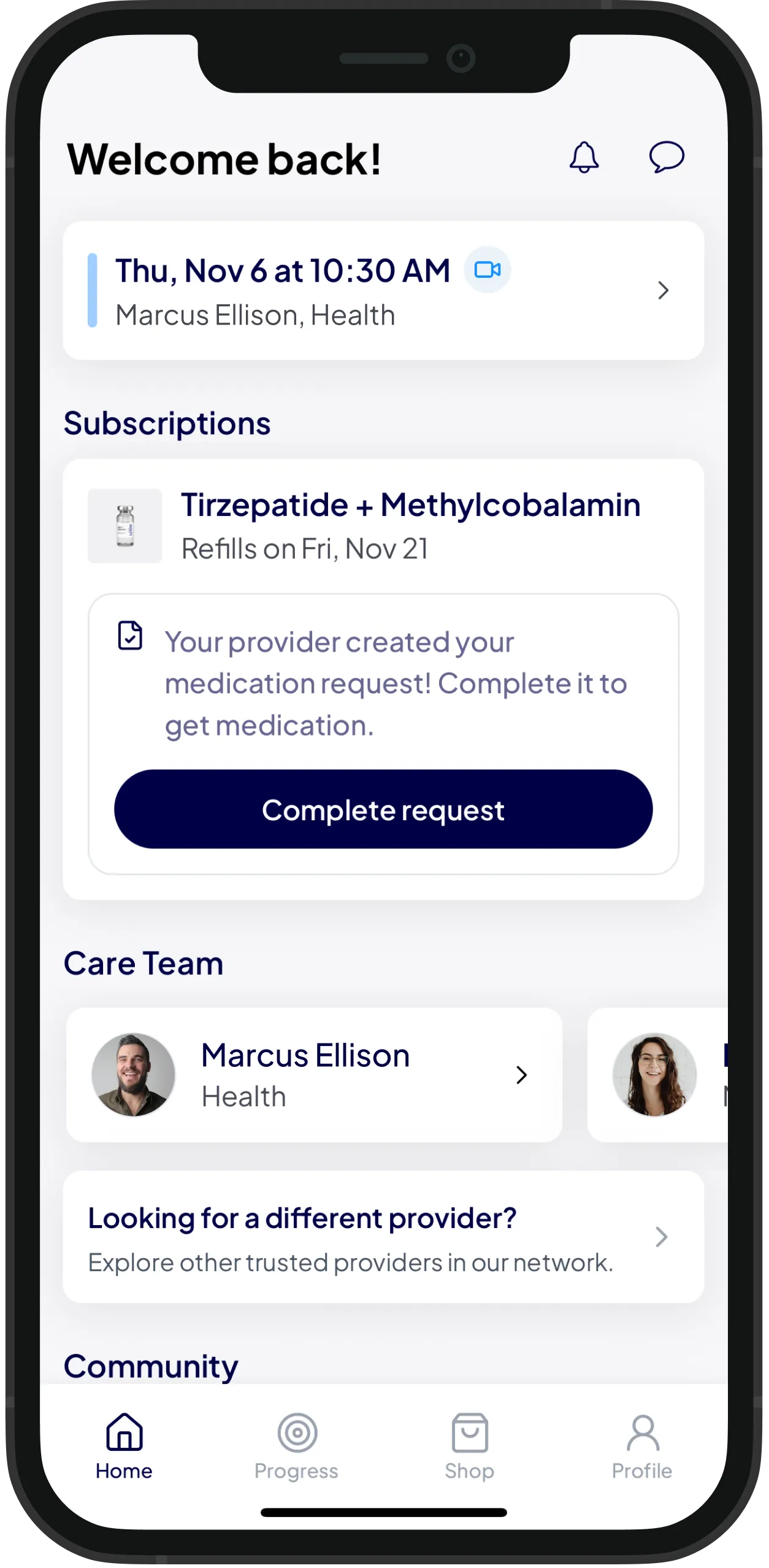Ready to transform your health?
Unlock access to expert guidance and a weight care plan crafted just for you.
Similar Articles
Similar Articles

GLP-1s for Athletes: Performance, Body Composition, and Recovery
GLP-1s for Athletes: Performance, Body Composition, and Recovery

What Labs Should You Monitor on GLP-1s? A Complete Biomarker Guide
What Labs Should You Monitor on GLP-1s? A Complete Biomarker Guide

Does Semaglutide Affect Fertility or Pregnancy?
Does Semaglutide Affect Fertility or Pregnancy?
GLP-1 for PCOS: What the Science Shows
Learn how GLP 1 medications like semaglutide and tirzepatide help people with PCOS by improving weight, insulin resistance, inflammation, and metabolic symptoms. See what studies show and whether treatment may be right for you.

Table of Contents
Table of Contents
Why PCOS and GLP-1s Are Connected
What Clinical Studies Show about GLP-1s and PCOS
How GLP-1s Help With Common PCOS Symptoms
What GLP-1s Do Not Treat In PCOS
How GLP-1s Compare With Other PCOS Treatments
Are GLP-1s Safe for People with PCOS?
Who Might Benefit Most from GLP-1 Treatment for PCOS
Nutrition for PCOS While Taking GLP-1s
FAQs
References
Why PCOS and GLP-1s Are Connected
What Clinical Studies Show about GLP-1s and PCOS
How GLP-1s Help With Common PCOS Symptoms
What GLP-1s Do Not Treat In PCOS
How GLP-1s Compare With Other PCOS Treatments
Are GLP-1s Safe for People with PCOS?
Who Might Benefit Most from GLP-1 Treatment for PCOS
Nutrition for PCOS While Taking GLP-1s
FAQs
References
Polycystic ovary syndrome, or PCOS, affects millions of women and people assigned female at birth and is one of the most common hormonal and metabolic conditions worldwide. Many people with PCOS experience persistent symptoms that are difficult to manage, including weight gain, cravings, fatigue, insulin resistance, irregular or unpredictable menstrual cycles, and inflammation. Even with lifestyle changes, it is common to feel as if progress is slow or inconsistent. Because GLP 1 medications directly influence appetite, insulin response, and metabolic regulation, they have become an area of growing interest for people with PCOS who want support that aligns with the biology of their condition.
GLP 1 medications such as semaglutide and tirzepatide were originally designed for type 2 diabetes, but their effects on appetite, weight, blood sugar stability, and inflammation overlap with many of the core challenges seen in PCOS. As a result, researchers have begun exploring how these medications might be used to support people with PCOS, especially those experiencing metabolic symptoms or difficulty losing weight.
If you are considering whether GLP 1 treatment might be an option for your PCOS symptoms, you can start by checking your eligibility here:
Why PCOS and GLP-1 Medications Are Connected
At the center of PCOS is a strong connection to insulin resistance. When the body becomes less responsive to insulin, it must produce more of it, which increases hunger signals, makes cravings stronger, and encourages the body to store energy rather than burn it. Over time, this pattern can lead to elevated blood sugar, weight gain around the abdomen, inflammation, hormonal imbalances, and difficulty with ovulation. Many of the symptoms that feel unrelated, such as fatigue, brain fog, irregular cycles, and stubborn weight, are actually tied to this underlying insulin relationship.
GLP 1 medications work on the same pathways that PCOS disrupts. They help regulate insulin release, slow digestion, reduce appetite, and support more stable blood sugar levels. People often find that they feel full sooner, experience fewer cravings, and have more consistent energy throughout the day. Because these medications also reduce inflammation and support weight loss, they may help address several of the most challenging aspects of PCOS at once.
What Clinical Studies Show about GLP-1s and PCOS
There is growing research exploring how GLP 1 medications affect individuals with PCOS. Although PCOS-specific studies are smaller than diabetes trials, the findings so far are encouraging and consistently point in a similar direction.
One of the most well known PCOS studies was published in Reproductive Biology and Endocrinology, where researchers followed women with PCOS and obesity who used semaglutide for about six months. Participants experienced meaningful weight loss and showed significant improvements in insulin sensitivity, fasting blood sugar, and inflammatory markers. Some patients also reported more predictable menstrual cycles, suggesting that hormonal balance may improve when insulin resistance decreases.


Another earlier study looked at liraglutide in women with PCOS and found that it helped reduce visceral fat, the deeper abdominal fat that is strongly linked with insulin resistance and inflammation. This type of fat is hard to lose with diet and exercise alone, so the reduction seen in this study is notable. Participants also saw improvements in waist circumference, blood pressure, and cholesterol, all of which are relevant for long term metabolic health.

Tirzepatide is another medication drawing attention, especially because it activates both GLP 1 and GIP receptors. While more PCOS-specific trials are needed, early studies in metabolic populations suggest that tirzepatide may offer even greater improvements in insulin resistance and weight. These effects could be especially meaningful for people with PCOS who have struggled with metabolic symptoms for many years.
Overall, the scientific picture suggests that GLP 1 medications can play an important role in improving metabolic pathways that directly influence PCOS symptoms.
How GLP-1s May Help with Common PCOS Symptoms
People with PCOS often face a cluster of interrelated symptoms. Because GLP 1s act on appetite, insulin response, and metabolic regulation, they can support several areas at once.
Many individuals with PCOS report difficulty losing weight even when their calorie intake is moderate. GLP 1s can reduce appetite in a steady, natural way while improving insulin sensitivity, which makes weight loss more achievable. As blood sugar and insulin become more stable, cravings tend to decrease, especially cravings for sweets or refined carbohydrates. Some people also experience fewer energy crashes and more consistent energy throughout the day.
Another area where some individuals notice improvement is menstrual regularity. When insulin resistance decreases, hormonal rhythms can become more stable. While GLP 1s are not hormone medications and are not designed to regulate cycles directly, the metabolic improvements they cause can indirectly support more predictable patterns in some people.
GLP 1 medications may also help reduce inflammation, which is a known component of PCOS. Lower inflammation can contribute to better energy, improved metabolic markers, and smoother weight regulation.
What GLP-1s Do Not Treat in PCOS
GLP 1 medications are helpful for many metabolic symptoms, but they do not address every part of PCOS. They do not cure PCOS or directly treat elevated androgen levels. They are not fertility medications and do not replace hormonal treatments when those are needed. They also do not replace nutrition, exercise, or sleep, which all play important roles in managing PCOS.
For many people, the most effective PCOS plan combines GLP 1 support with lifestyle changes, nutrition guidance, and, when needed, medications such as birth control pills, spironolactone, or metformin. GLP 1s are best understood as one tool in a broader treatment plan rather than a standalone solution.
Are GLP-1s Safe for People with PCOS
Studies that examined GLP 1 use in PCOS reported safety profiles similar to those seen in the general population. The most common side effects include nausea, bloating, constipation, or early fullness. These generally improve as the body adjusts or when the dose is increased gradually. Because appetite tends to decrease, it can be helpful to pay closer attention to protein, fiber, and hydration.
Your healthcare provider can help determine whether GLP 1 medications fit your symptoms, goals, and long term plan.
Who Might Benefit Most From GLP-1 Treatment for PCOS
GLP 1 medications may be helpful for people with PCOS who experience persistent insulin resistance, difficulty losing weight, strong cravings, or symptoms tied closely to metabolic imbalance. They may also be a good option for individuals who have tried lifestyle modifications and other medications without seeing meaningful improvement. They may not be the right choice for people trying to conceive immediately, because weight changes and medication adjustments require careful timing.
If you are curious about whether this treatment might work for your PCOS symptoms, you can check your eligibility here:
Nutrition for PCOS While Taking GLP-1s
Because GLP 1 medications reduce appetite, it is important for people with PCOS to be intentional about protein, fiber, and nutrient intake. Balanced meals that stabilize blood sugar tend to work well, including meals built around yogurt, eggs, tofu, salmon, cooked vegetables, beans, lentils, cottage cheese, chicken, or protein smoothies.
A steady eating pattern combined with resistance training can help preserve muscle, improve insulin sensitivity, and support long term weight stability. People often find that even small adjustments to routine meals make a noticeable difference in how they feel.
FAQs
Do GLP 1 medications help with PCOS?
They may help with insulin resistance, weight, cravings, inflammation, and, in some cases, menstrual regularity.
Do they help with fertility?
They can support metabolic health, which may indirectly help with ovulation, but they are not fertility drugs.
Can people with lean PCOS use GLP 1s?
Some may, especially if insulin resistance is present, but treatment depends on individual needs.
Do GLP 1s replace metformin?
Not always. Some people use them together, others use one or the other.
How long does it take to see a change?
Many people begin noticing differences in appetite and cravings within a few weeks. Metabolic markers often improve after two to three months.
Check Your Eligibility
If you are interested in GLP 1 treatment for PCOS or want to understand whether compounded semaglutide may be an option, you can start by completing Mochi’s eligibility questionnaire. It takes only a few minutes and helps our clinical team understand your symptoms and goals. You can begin your eligibility check today and explore whether this treatment may be a fit for your PCOS care. Check your eligibility
References
Astrup, A., Rössner, S., Van Gaal, L., Rissanen, A., Niskanen, L., Al Hakim, M., Madsen, J., Rasmussen, M. F., and Lean, M. E. (2014). Effects of liraglutide in the treatment of obesity in women with polycystic ovary syndrome. International Journal of Obesity, 38(9), 1265 to 1273.
Elkind-Hirsch, K., Chappell, N., Shaler, D., D'Ambrosio, L., and Miller, P. (2021). Effects of semaglutide on weight loss, body composition, and hormonal and metabolic markers in women with PCOS. Reproductive Biology and Endocrinology, 19, 1 to 10.
Hoertel, H. A., Willingham, B., Kephart, W., et al. (2021). Dietary protein and muscle preservation during weight loss. The American Journal of Clinical Nutrition, 113(6), 1471 to 1485.
Longland, T. M., Oikawa, S. Y., Mitchell, C. J., et al. (2016). High protein intake during energy deficit promotes greater lean mass retention. The American Journal of Clinical Nutrition, 103(3), 738 to 746.
Rosenbaum, M., and Leibel, R. L. (2010). Adaptive thermogenesis in humans. International Journal of Obesity, 34(S1), S47 to S55.
USDA FoodData Central. (2024). Nutrient density of common foods.
Polycystic ovary syndrome, or PCOS, affects millions of women and people assigned female at birth and is one of the most common hormonal and metabolic conditions worldwide. Many people with PCOS experience persistent symptoms that are difficult to manage, including weight gain, cravings, fatigue, insulin resistance, irregular or unpredictable menstrual cycles, and inflammation. Even with lifestyle changes, it is common to feel as if progress is slow or inconsistent. Because GLP 1 medications directly influence appetite, insulin response, and metabolic regulation, they have become an area of growing interest for people with PCOS who want support that aligns with the biology of their condition.
GLP 1 medications such as semaglutide and tirzepatide were originally designed for type 2 diabetes, but their effects on appetite, weight, blood sugar stability, and inflammation overlap with many of the core challenges seen in PCOS. As a result, researchers have begun exploring how these medications might be used to support people with PCOS, especially those experiencing metabolic symptoms or difficulty losing weight.
If you are considering whether GLP 1 treatment might be an option for your PCOS symptoms, you can start by checking your eligibility here:
Why PCOS and GLP-1 Medications Are Connected
At the center of PCOS is a strong connection to insulin resistance. When the body becomes less responsive to insulin, it must produce more of it, which increases hunger signals, makes cravings stronger, and encourages the body to store energy rather than burn it. Over time, this pattern can lead to elevated blood sugar, weight gain around the abdomen, inflammation, hormonal imbalances, and difficulty with ovulation. Many of the symptoms that feel unrelated, such as fatigue, brain fog, irregular cycles, and stubborn weight, are actually tied to this underlying insulin relationship.
GLP 1 medications work on the same pathways that PCOS disrupts. They help regulate insulin release, slow digestion, reduce appetite, and support more stable blood sugar levels. People often find that they feel full sooner, experience fewer cravings, and have more consistent energy throughout the day. Because these medications also reduce inflammation and support weight loss, they may help address several of the most challenging aspects of PCOS at once.
What Clinical Studies Show about GLP-1s and PCOS
There is growing research exploring how GLP 1 medications affect individuals with PCOS. Although PCOS-specific studies are smaller than diabetes trials, the findings so far are encouraging and consistently point in a similar direction.
One of the most well known PCOS studies was published in Reproductive Biology and Endocrinology, where researchers followed women with PCOS and obesity who used semaglutide for about six months. Participants experienced meaningful weight loss and showed significant improvements in insulin sensitivity, fasting blood sugar, and inflammatory markers. Some patients also reported more predictable menstrual cycles, suggesting that hormonal balance may improve when insulin resistance decreases.


Another earlier study looked at liraglutide in women with PCOS and found that it helped reduce visceral fat, the deeper abdominal fat that is strongly linked with insulin resistance and inflammation. This type of fat is hard to lose with diet and exercise alone, so the reduction seen in this study is notable. Participants also saw improvements in waist circumference, blood pressure, and cholesterol, all of which are relevant for long term metabolic health.

Tirzepatide is another medication drawing attention, especially because it activates both GLP 1 and GIP receptors. While more PCOS-specific trials are needed, early studies in metabolic populations suggest that tirzepatide may offer even greater improvements in insulin resistance and weight. These effects could be especially meaningful for people with PCOS who have struggled with metabolic symptoms for many years.
Overall, the scientific picture suggests that GLP 1 medications can play an important role in improving metabolic pathways that directly influence PCOS symptoms.
How GLP-1s May Help with Common PCOS Symptoms
People with PCOS often face a cluster of interrelated symptoms. Because GLP 1s act on appetite, insulin response, and metabolic regulation, they can support several areas at once.
Many individuals with PCOS report difficulty losing weight even when their calorie intake is moderate. GLP 1s can reduce appetite in a steady, natural way while improving insulin sensitivity, which makes weight loss more achievable. As blood sugar and insulin become more stable, cravings tend to decrease, especially cravings for sweets or refined carbohydrates. Some people also experience fewer energy crashes and more consistent energy throughout the day.
Another area where some individuals notice improvement is menstrual regularity. When insulin resistance decreases, hormonal rhythms can become more stable. While GLP 1s are not hormone medications and are not designed to regulate cycles directly, the metabolic improvements they cause can indirectly support more predictable patterns in some people.
GLP 1 medications may also help reduce inflammation, which is a known component of PCOS. Lower inflammation can contribute to better energy, improved metabolic markers, and smoother weight regulation.
What GLP-1s Do Not Treat in PCOS
GLP 1 medications are helpful for many metabolic symptoms, but they do not address every part of PCOS. They do not cure PCOS or directly treat elevated androgen levels. They are not fertility medications and do not replace hormonal treatments when those are needed. They also do not replace nutrition, exercise, or sleep, which all play important roles in managing PCOS.
For many people, the most effective PCOS plan combines GLP 1 support with lifestyle changes, nutrition guidance, and, when needed, medications such as birth control pills, spironolactone, or metformin. GLP 1s are best understood as one tool in a broader treatment plan rather than a standalone solution.
Are GLP-1s Safe for People with PCOS
Studies that examined GLP 1 use in PCOS reported safety profiles similar to those seen in the general population. The most common side effects include nausea, bloating, constipation, or early fullness. These generally improve as the body adjusts or when the dose is increased gradually. Because appetite tends to decrease, it can be helpful to pay closer attention to protein, fiber, and hydration.
Your healthcare provider can help determine whether GLP 1 medications fit your symptoms, goals, and long term plan.
Who Might Benefit Most From GLP-1 Treatment for PCOS
GLP 1 medications may be helpful for people with PCOS who experience persistent insulin resistance, difficulty losing weight, strong cravings, or symptoms tied closely to metabolic imbalance. They may also be a good option for individuals who have tried lifestyle modifications and other medications without seeing meaningful improvement. They may not be the right choice for people trying to conceive immediately, because weight changes and medication adjustments require careful timing.
If you are curious about whether this treatment might work for your PCOS symptoms, you can check your eligibility here:
Nutrition for PCOS While Taking GLP-1s
Because GLP 1 medications reduce appetite, it is important for people with PCOS to be intentional about protein, fiber, and nutrient intake. Balanced meals that stabilize blood sugar tend to work well, including meals built around yogurt, eggs, tofu, salmon, cooked vegetables, beans, lentils, cottage cheese, chicken, or protein smoothies.
A steady eating pattern combined with resistance training can help preserve muscle, improve insulin sensitivity, and support long term weight stability. People often find that even small adjustments to routine meals make a noticeable difference in how they feel.
FAQs
Do GLP 1 medications help with PCOS?
They may help with insulin resistance, weight, cravings, inflammation, and, in some cases, menstrual regularity.
Do they help with fertility?
They can support metabolic health, which may indirectly help with ovulation, but they are not fertility drugs.
Can people with lean PCOS use GLP 1s?
Some may, especially if insulin resistance is present, but treatment depends on individual needs.
Do GLP 1s replace metformin?
Not always. Some people use them together, others use one or the other.
How long does it take to see a change?
Many people begin noticing differences in appetite and cravings within a few weeks. Metabolic markers often improve after two to three months.
Check Your Eligibility
If you are interested in GLP 1 treatment for PCOS or want to understand whether compounded semaglutide may be an option, you can start by completing Mochi’s eligibility questionnaire. It takes only a few minutes and helps our clinical team understand your symptoms and goals. You can begin your eligibility check today and explore whether this treatment may be a fit for your PCOS care. Check your eligibility
References
Astrup, A., Rössner, S., Van Gaal, L., Rissanen, A., Niskanen, L., Al Hakim, M., Madsen, J., Rasmussen, M. F., and Lean, M. E. (2014). Effects of liraglutide in the treatment of obesity in women with polycystic ovary syndrome. International Journal of Obesity, 38(9), 1265 to 1273.
Elkind-Hirsch, K., Chappell, N., Shaler, D., D'Ambrosio, L., and Miller, P. (2021). Effects of semaglutide on weight loss, body composition, and hormonal and metabolic markers in women with PCOS. Reproductive Biology and Endocrinology, 19, 1 to 10.
Hoertel, H. A., Willingham, B., Kephart, W., et al. (2021). Dietary protein and muscle preservation during weight loss. The American Journal of Clinical Nutrition, 113(6), 1471 to 1485.
Longland, T. M., Oikawa, S. Y., Mitchell, C. J., et al. (2016). High protein intake during energy deficit promotes greater lean mass retention. The American Journal of Clinical Nutrition, 103(3), 738 to 746.
Rosenbaum, M., and Leibel, R. L. (2010). Adaptive thermogenesis in humans. International Journal of Obesity, 34(S1), S47 to S55.
USDA FoodData Central. (2024). Nutrient density of common foods.
Read next
Ready to transform your health?
Unlock access to expert guidance and a weight care plan crafted just for you.

Ready to transform your health?
Unlock access to expert guidance and a weight care plan crafted just for you.

Ready to transform your health?
Unlock access to expert guidance and a weight care plan crafted just for you.


© 2026 Mochi Health
All professional medical services are provided by licensed physicians and clinicians affiliated with independently owned and operated professional practices. Mochi Health Corp. provides administrative and technology services to affiliated medical practices it supports, and does not provide any professional medical services itself.


© 2026 Mochi Health
All professional medical services are provided by licensed physicians and clinicians affiliated with independently owned and operated professional practices. Mochi Health Corp. provides administrative and technology services to affiliated medical practices it supports, and does not provide any professional medical services itself.


© 2026 Mochi Health
All professional medical services are provided by licensed physicians and clinicians affiliated with independently owned and operated professional practices. Mochi Health Corp. provides administrative and technology services to affiliated medical practices it supports, and does not provide any professional medical services itself.

















